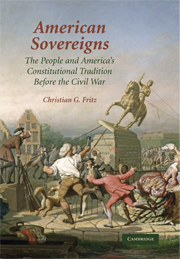Book contents
- Frontmatter
- Contents
- Acknowledgments
- 1 Prologue
- PART ONE THE PEOPLE'S SOVEREIGNTY IN THE STATES
- 2 Revolutionary Constitutionalism
- 3 Grassroots Self-Government: America's Early Determinist Movements
- 4 Revolutionary Tensions: “Friends of Government” Confront “The Regulators” in Massachusetts
- PART TWO THE SOVEREIGN BEHIND THE FEDERAL CONSTITUTION
- PART THREE THE STRUGGLE OVER A CONSTITUTIONAL MIDDLE GROUND
- Key to abbreviations
- Notes
- Selected Short Titles
- Credits
- Index
3 - Grassroots Self-Government: America's Early Determinist Movements
Published online by Cambridge University Press: 31 January 2011
- Frontmatter
- Contents
- Acknowledgments
- 1 Prologue
- PART ONE THE PEOPLE'S SOVEREIGNTY IN THE STATES
- 2 Revolutionary Constitutionalism
- 3 Grassroots Self-Government: America's Early Determinist Movements
- 4 Revolutionary Tensions: “Friends of Government” Confront “The Regulators” in Massachusetts
- PART TWO THE SOVEREIGN BEHIND THE FEDERAL CONSTITUTION
- PART THREE THE STRUGGLE OVER A CONSTITUTIONAL MIDDLE GROUND
- Key to abbreviations
- Notes
- Selected Short Titles
- Credits
- Index
Summary
As delegates to the Continental Congress met in Philadelphia in the fall of 1775 they coordinated America's resistance to the world's greatest military power. Delegates were exhausted by meetings that stretched from morning until night, six days a week. They tried to find funds and supplies for Washington's newly formed army. Vindicating “the just rights and liberties” of the “great Continent” of North America required more than ringing words of rhetoric.
John Adams, one of Massachusetts's delegates, worked as hard as anyone. He funneled his energies into assessing the damage inflicted by British troops and fretted over how to acquire saltpeter – used in the production of gunpowder. As “Mistress of the sea,” Britain could get saltpeter from many different places, but Americans would need to develop a domestic supply. Victory or defeat hinged on adequate production and Adams vowed “never to have Salt Petre out of my Mind.”
In overseeing the war effort, Congress tried to get the colonies to work together. Even as Connecticut's delegates conceded on October 17 that “united Efforts” were necessary to protect America's “common Rights and Liberties,” they squabbled with Pennsylvania's delegates over who was entitled to settle the Wyoming valley near the Susquehanna River. The failure of those two colonies to resolve their differences brought Congress into the controversy and proved a distraction.
Congress also responded to practical questions of how a people in revolt against an established government should approach self-government.
- Type
- Chapter
- Information
- American SovereignsThe People and America's Constitutional Tradition Before the Civil War, pp. 47 - 79Publisher: Cambridge University PressPrint publication year: 2007



